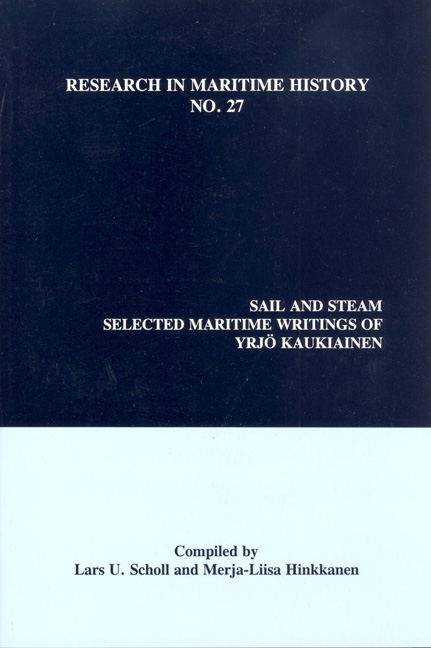Book contents
- Frontmatter
- Frontispiece
- Table of Contents
- Acknowledgements
- “Yrjö Kaukiainen: A Tribute on the Occasion of his Forthcoming Retirement as Professor of Maritime History at the University of Helsinki”
- “Yrjö Kaukiainen: A Man of the Sea”
- “Yrjö Kaukiainen and the Development of Maritime Economic History”
- “Finnish Sailors, 1750-1870”
- “Finnish and International Maritime Labour in the Age of Sail: Was There a Market?”
- “Five Years before the Mast: Observations on the Conditions of Maritime Labour in Finland and Elsewhere”
- “The Maritime Labour Market: Skill and Experience as Factors of Demand and Supply”
- “Owners and Masters: Management and Managerial Skills in the Finnish Ocean-Going Merchant Fleet, c. 1840-1880”
- “From Low-Cost to High-Cost Shipping: Finnish Maritime Labour Costs after the Second World War”
- “The Modernization of Finnish Coastal Shipping and Railway Competition c. 1830-1913”
- “British Timber Imports and Finnish Shipping 1860-1910”
- “Baltic Timber-Trade under Sail: An Example of the Persistence of Old Techniques”
- “Coal and Canvas: Aspects of the Competition between Steam and Sail, c. 1870-1914”
- “Dutch Shipping and the Swedish Navigation Act (1724). A Case Study”
- “Seamen Ashore: Port Visits of Late Nineteenth-Century Finnish Sailors”
- “Wreck-plundering by East Finnish Coastal People - Criminal Tradition or Popular Culture?”
- “From Days and Knots to Pounds and Dollars: Some Problems in the Study of the Economics of Late Nineteenth Century Merchant Shipping”
- “Tons and Tonnages: Ship Measurement and Shipping Statistics, c. 1870-1980”
- “International Freight Markets in the 1830s and 1840s: The Experience of a Major Finnish Shipowner”
- “Shrinking the World: Improvements in the Speed of Information Transmission, c. 1820-1870”
- “Yrjö Kaukiainen: A Maritime Bibliography”
“Yrjö Kaukiainen and the Development of Maritime Economic History”
- Frontmatter
- Frontispiece
- Table of Contents
- Acknowledgements
- “Yrjö Kaukiainen: A Tribute on the Occasion of his Forthcoming Retirement as Professor of Maritime History at the University of Helsinki”
- “Yrjö Kaukiainen: A Man of the Sea”
- “Yrjö Kaukiainen and the Development of Maritime Economic History”
- “Finnish Sailors, 1750-1870”
- “Finnish and International Maritime Labour in the Age of Sail: Was There a Market?”
- “Five Years before the Mast: Observations on the Conditions of Maritime Labour in Finland and Elsewhere”
- “The Maritime Labour Market: Skill and Experience as Factors of Demand and Supply”
- “Owners and Masters: Management and Managerial Skills in the Finnish Ocean-Going Merchant Fleet, c. 1840-1880”
- “From Low-Cost to High-Cost Shipping: Finnish Maritime Labour Costs after the Second World War”
- “The Modernization of Finnish Coastal Shipping and Railway Competition c. 1830-1913”
- “British Timber Imports and Finnish Shipping 1860-1910”
- “Baltic Timber-Trade under Sail: An Example of the Persistence of Old Techniques”
- “Coal and Canvas: Aspects of the Competition between Steam and Sail, c. 1870-1914”
- “Dutch Shipping and the Swedish Navigation Act (1724). A Case Study”
- “Seamen Ashore: Port Visits of Late Nineteenth-Century Finnish Sailors”
- “Wreck-plundering by East Finnish Coastal People - Criminal Tradition or Popular Culture?”
- “From Days and Knots to Pounds and Dollars: Some Problems in the Study of the Economics of Late Nineteenth Century Merchant Shipping”
- “Tons and Tonnages: Ship Measurement and Shipping Statistics, c. 1870-1980”
- “International Freight Markets in the 1830s and 1840s: The Experience of a Major Finnish Shipowner”
- “Shrinking the World: Improvements in the Speed of Information Transmission, c. 1820-1870”
- “Yrjö Kaukiainen: A Maritime Bibliography”
Summary
Economic historians are frequently referred to - both by other historians and by themselves - as “plumbers.” As a person who cannot even replace a damaged washer in a kitchen tap - a failing that I have discovered over the years I share with a disturbingly large proportion of my colleagues - 1 have always found this nickname to be at best ironic and at worst oxymoronic. Regardless, economic historians are generally viewed by outsiders to the guild as people who possess certain esoteric technical skills but lack the humanistic sensibility that has always illuminated the work of the best historians.
Maritime historians have long suffered similar derision from a significant number of scholars in other fields. Perhaps the most charitable (and probably the most common) epithet hurled at those who chose to study ships, mariners and maritime transport is to tar them as “antiquarians,” people who write only for each other and who seldom burden their readers with either context or breadth of vision.
Even a cursory glance at the literature in maritime economic history will yield a disappointingly large (but fortunately decreasing) number of authors who fit one - or both - of these descriptions. But lest a scholar who approaches maritime topics from the perspective of economic history feel the need to renounce his or her specialization, I suggest strongly that they turn for inspiration to the impressive body of works that over the years have issued from the pen (and computer) of Professor Yrjö Kaukianen. In the years that I have known him and his work I have always been impressed, challenged and, perhaps most important, reassured by Yrjö and his logical, meticulous, insightful and humane writings. If you know his work, you will find many moments of intellectual joy in this collection, which his friends in the International Maritime Economic History Association are presenting him on the occasion of his retirement from the University of Helsinki, nuggets that remind you how privileged you are to be entertained, instructed and enlightened by a scholar with a truly brilliant mind. But if you are coming to his contributions to the literature fresh, you will soon understand why Yrjö Kaukiainen makes me both proud and, to be totally honest, a bit humbled to be a maritime economic historian.
- Type
- Chapter
- Information
- Sail and SteamSelected Maritime Writings of Yrjö Kaukiainen, pp. xxi - xxivPublisher: Liverpool University PressPrint publication year: 2004

